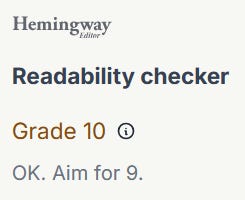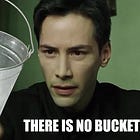This August, Selectionist quietly celebrated its first anniversary. Since we seem to attach special significance to making a full orbit of the sun, allow me to share briefly about my goals and experiences writing this blog, and my intentions moving forward.
First of all, some words of appreciation. The thought that you, most of whom are random internet strangers, think I have anything worth saying humbles me and fills me with gratitude. And so, from the bottom of my heart, thank you.
Aims
This blog was created with the aim of science dissemination. This broad goal is served by 3 guiding principles:
1. Be accessible.
I treat each article as an ELI5 (explain like I’m 5) challenge to make important but inaccessible concepts and tools readily available to the general audience.

This means I mostly avoid jargon (or explain them simply), keep my articles short, and make them contextually relevant to a broad audience using metaphors and real-world examples1.
At the moment, the majority of you readers are similar to me (some of you have even trained and mentored me). I’m delighted to have you. But it also means Selectionist has not reached the breadth of readership I hoped it would. There’s more work to be done on that front.
2. Be science-based.
What science exactly? My training is in behaviour analysis, a natural science of behaviour. That’s nested more broadly within an evolutionary worldview, and I’m also deeply interested in complex adaptive systems thinking.
Writing by nature involves interpretation. Many of the most popular behavioural science/psychology blogs on Substack are highly interpretative, which means they sometimes go beyond what the science suggests. With Selectionist, I aim to stay close to the science, and keep my interpretations grounded. That takes a lot of work—I spend a considerable amount of time reading the research literature in preparation for each article, even on topics I’m quite familiar with. For my nudge series, I prepared for 4 months (with somewhere between 30-50 hrs of reading, and many more thinking) before I wrote the first article. It is also unsexy, and may not win me readers, but I’m inclined to stay the course for now2.
3. Be useful.
As mentioned, in my articles, I try my best to contextualise my discussions. Selectionist doesn’t operate in the realm of BIG IDEAS and theory development. There’s value in that, but we’re more pragmatically focused on solving real-world problems. You can say we’re more akin to engineers than theoretical physicists. You may find that many of the motivating examples I include in my articles are from healthcare and environmental sustainability. That’s because these problems interest me the most. I also happen to be a population health and implementation science researcher.
On Writing
What do I choose to write about?
The simple boring answer is—topics that interest me or that I’m currently thinking about (typically both). I have an idea bank with notes on topics I would like to write about (currently >10 ideas). Some will fit in standalone articles, others will require 2 or more articles, like my nudge series. These multipart series require a lot more work (and frankly, daunt me), so they won’t be that frequent.
How do I write?
When I decide to write an article, I always begin with reading. I probably spend as much time (if not more) reading as writing for each article. Writing is usually done during my commutes on my phone, or in the evenings after my kids have slept, and stillness reigns. After completing a draft, I typically pass it through an LMM, and incorporate the feedback I find relevant. I estimate about 10-20% of each article has been refined by LLM inputs.
Initially, I committed to writing an article a month, but that quickly fell through with the arrival of my second child. Writing is hard, especially with 2 young children whose raison d’être is to increase entropy. In one instance, I forced myself to write and publish an article to meet my monthly target, and ended up with a piece which I deeply dislike (I’ll let you guess which one that is).
Looking Forward
Currently, Selectionist has close to 100 subscribers. While I expected more (and a broader) readership when I started this publication, considering my negligible social media presence and refusal to play LinkedIn/Substack algorithm games, I’d say 100 is a pretty good number! I’ll be happy to have added another 100 in a year’s time. The main outcome I’m focused on for Selectionist is creating content that I think is useful and am proud of.
Recently, an ex-professor and mentor of mine (hi Ben!) asked what’s my end goal with Selectionist. I don’t have an answer. Near-term, my priorities are family and work, so I’m happy for Selectionist to just chug along. Long-term, I think there’s some payoff to be found somewhere, but I don’t know when that’ll be, or if it’ll happen. Fortunately (or not), I’ve a pretty low delay- and uncertainty-discounting rate3.
To one more year!
Stats for the Nerds (as of September 26)
Article Stats
Number of articles: 10 (1 every 1.3 months)
Median article length: 2,366 words
Shortest article: What’s in a Nudge? Addendum (1,390 words)
Longest article: Living for the Moment (3,376 words)
Median article views: 187
Least viewed article: Solving Diabetes (125 views)
Most viewed article: A Very Profound Misunderstanding (1,062 views)
Reader Stats
Most views of an article by a single individual: 31 (!!)
No. of countries subscribers come from: 21 countries
Countries with most subscribers:
United States
Singapore
United Kingdom
India
Germany
Some among you might feel bothered by the imprecision of some of my metaphors, but my aim is not technical precision, but rather, conveying the broad structure of an idea.
I wrote a more interpretive article recently with my Solving Diabetes article, but I expect such articles will continue to be the exception rather than the norm.
Even so, long-term rewards typically have very negligible influence on behaviour. Currently, I’m allowing myself to read one book in the Wheel of Time series after publishing each article. This is an application of the Premack Principle.








This was a good recap, thanks! I love your content and am happy to have found a BA disseminating in such ways. There are so many ways to share this beautiful science and philosophy, and I think you do a great job. As far as future, I’d love to profile you (with others) and/or collab. I’ve been thinking of hosting “lives” to discuss some subtle topics and interview others. Perhaps you’d be interested in that? Anyway, glad to connect. Thanks for your content.